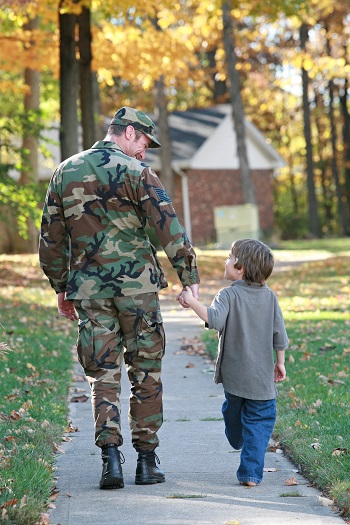In previous blogs, I’ve discussed military divorce and deployment issues. Moreover, it affects custody and visitation. This discussion will supplement those blogs. Moreover, it provides updates on issues revolving around deployment and its effect on child custody and visitation matters.
Although the Servicemembers Civil Relief Act (SCRA) offers tremendous help and guidance in protecting service members’ legal rights during deployment. Significant safeguards and procedures in the areas of child custody and visitation were lacking. To address these concerns, the Uniform Deployed Parents Custody and Visitation Act (UDPCVA) was enacted. South Carolina is one of the growing states that have adopted the UDPCVA.
The UDPCVA defines deployment as the movement or mobilization of a service member for more than 90 days. But less than 18 months pursuant to uniformed service orders that:
 are designated as unaccompanied;
are designated as unaccompanied;- do not authorize dependent travel or
- otherwise, do not permit the movement of family members to the location to which the service member is deployed.
Key Safeguards by UDPCVA
Thanks to the enactment of the UDPCVA and the adoption of the act by South Carolina. A South Carolina parent service member who faces deployment has procedures to address the unique situation and circumstances arising from his/her deployment. Several key safeguards addressed by UDPCVA include:
- Allowing a deploying parent, by power of attorney, to delegate all or part of custodial responsibility to an adult nonparent for the period of deployment where:
- no other parent possesses custodial responsibility under the law of the governing state or
- the other parent has a court order not to have contact with the child;
- A requirement for parents to communicate with each other regarding their child(ren)’s custody and visitation arrangements as soon as possible after a service member receives notice of his/her deployment;
- The deployment does not change the residence of the deploying parent;
- Where there is no involvement of imminent deployment. Any past or possible future deployment alone cannot be a negative factor in determining the best interest of the child during a custody proceeding;
- Procedures for parents who can reach agreements on custody arrangements to be able to do so by an out-of-court agreement;
- Providing for an expedited resolution of a custody arrangement in court;
- Barring any permanent custody order entering before or during deployment without the service member’s consent;
- Procedures set forth to address the different situations surrounding the termination of a temporary custody arrangement upon the service member’s return from deployment, including when the parents:
- mutually agree that a court should terminate the temporary custody agreement,
- mutually agree that a court should terminate the temporary custody order;
- Reach no agreement regarding the termination of the temporary custody arrangement and require a court to resolve whether a return to the permanent custody arrangement is appropriate,
- Testimony and evidence may be provided by electronic means unless the court finds reason otherwise;
- Setting forth a procedure and restrictions by which a deploying parent can designate a third party who shares a close relationship with the child to assume his/her custody or visitation responsibilities.
Helpful Guidelines
Overall, the UDPCVA provides helpful guidelines for deploying parents and the involved non-deploying parents to deal with the often stressful and difficult circumstances presented by deployment and manage parental responsibilities.
If you or your child’s other parent are facing deployment and need to address a custodial or visitation arrangement. You can contact the Hyde Law Firm, P.A. team to see whether we can help.
Source: The Uniform Deployed Parents Custody and Visitation Act, published at www.uniformlaws.org.




